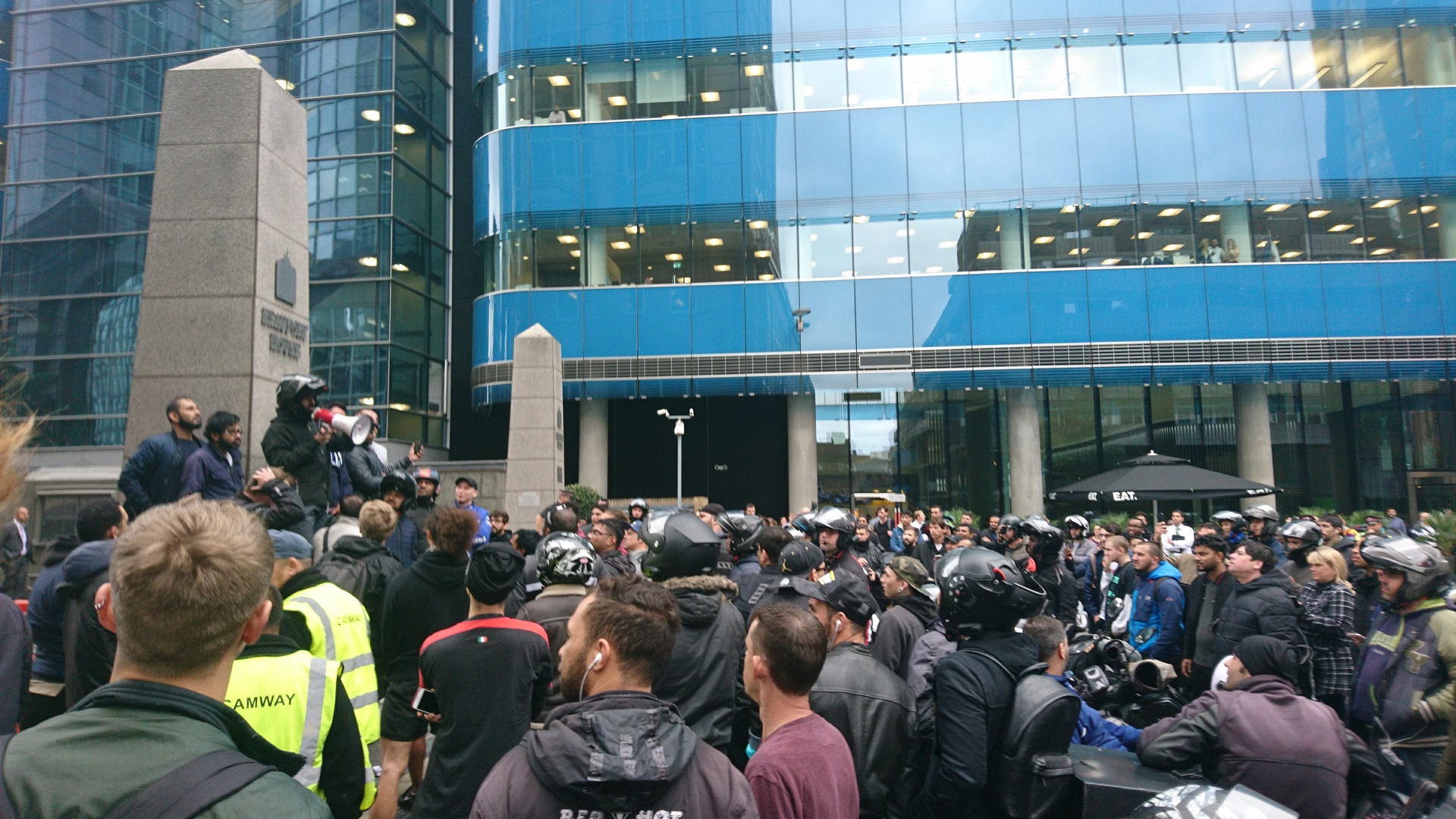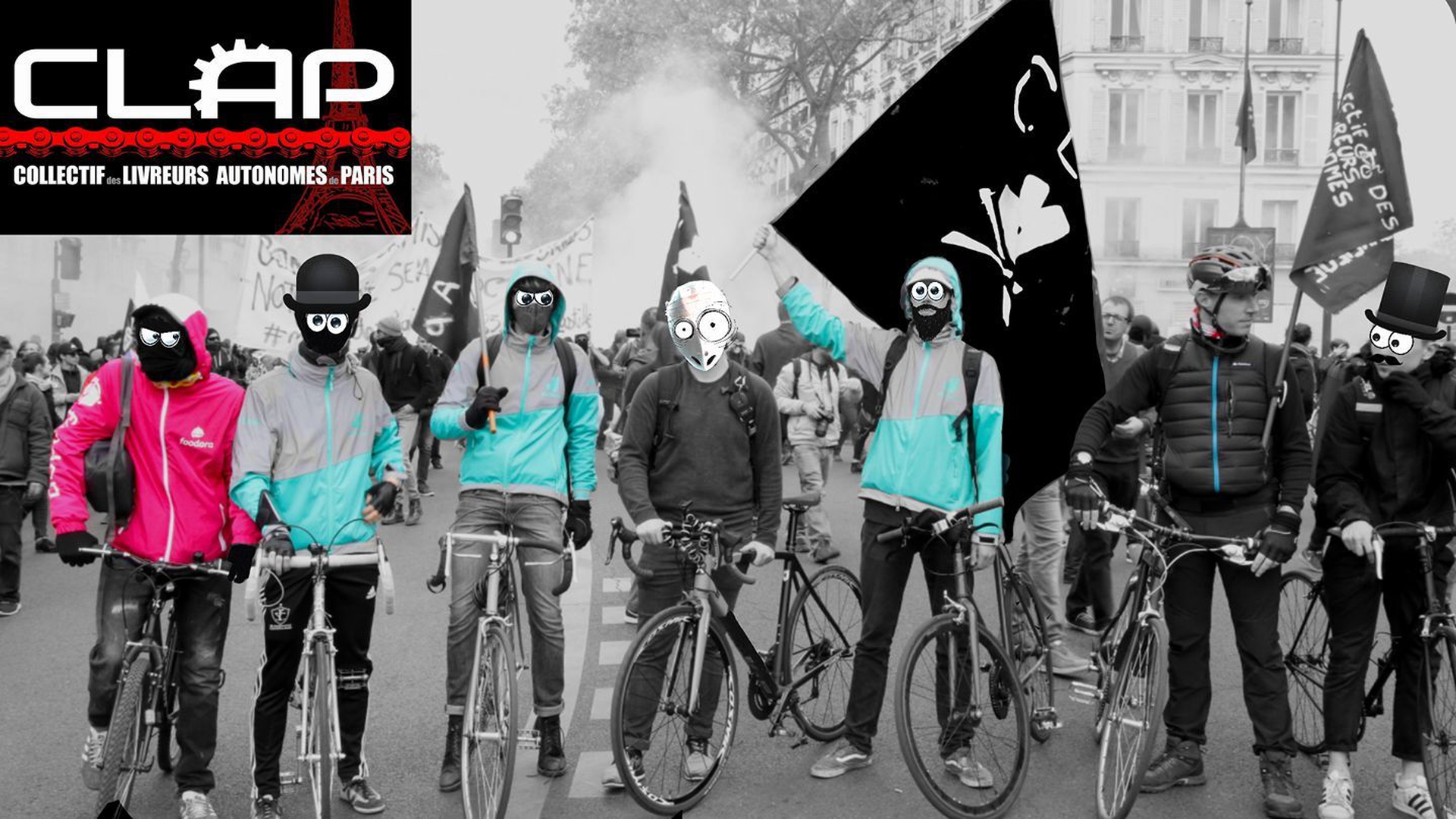Fast Food, Shutdown!
by
Achille Marotta,
Callum Cant (@CallumCant1)
October 1, 2018
Featured in A Month of Revolt in the Service Sector (#4)
Coordinated strike action spreads across the platform and hospitality sectors
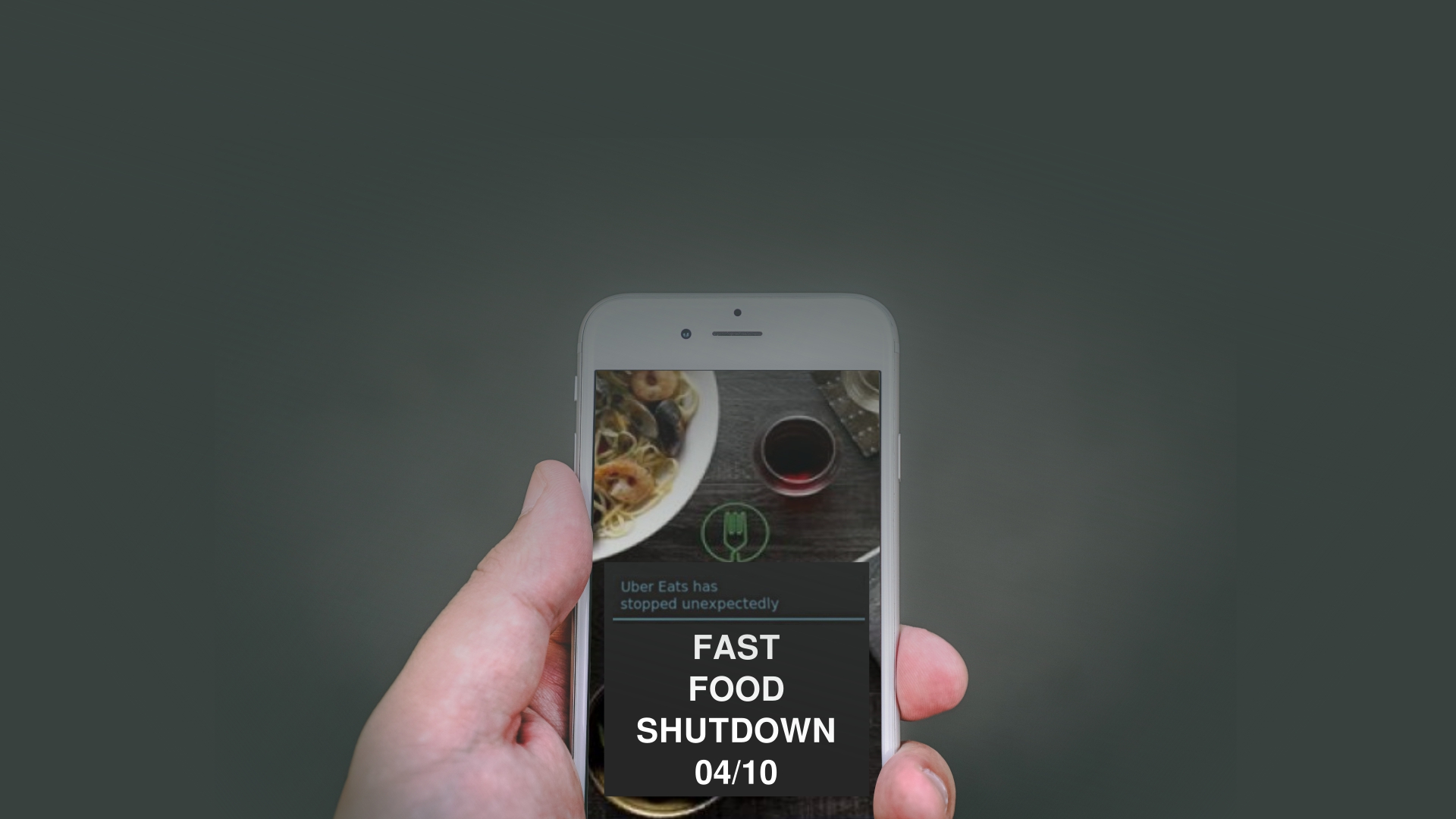
inquiry
Fast Food, Shutdown!
Coordinated strike action spreads across the platform and hospitality sectors
This Thursday, October 4th, workers at four companies will down tools as part of coordinated strike action.
The Bakers Food and Allied Workers Union (BFAWU) fast food campaign will now involve not just a McStrike, but also a Spoons Strike. Workers at two Wetherspoons pubs in Brighton are walking out for the first time in the company’s history. Workers organised with Unite at TGI Fridays will also take part in a coordinated day of strike action in the hospitality sector, with a joint rally at Leicester Square scheduled for 11am on the day.
However, the most significant development on Thursday will be the national combined strike action of UberEats and Uber taxis workers (organised with the IWW, IWGB, GMB and UPHD). Platform workers will, with this intervention, lead the development of a new industrial alliance.
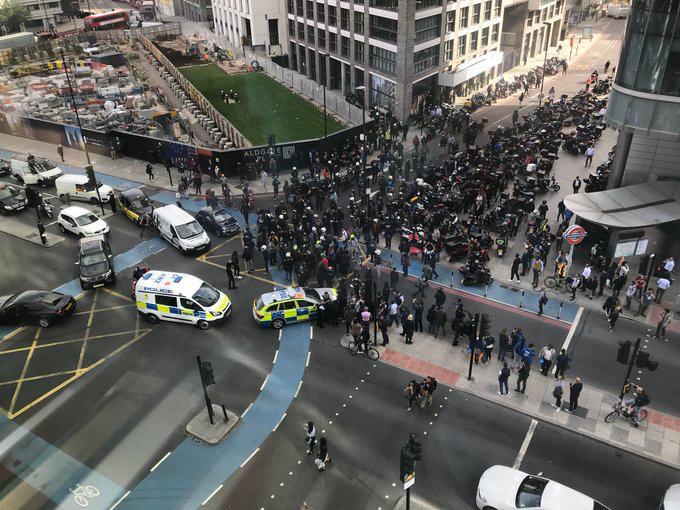
This combined action was made possible because the pre-organised strike date set by BFAWU and Unite happened to fall a fortnight after the biggest ever UberEats strike, in London. UberEats strikes in Cardiff, Plymouth, and Glasgow in the same month provided evidence of national momentum within the food platform workforce for a bigger fight. The IWW Couriers network, which has been the leading vehicle for food platform worker organising over the last year, was therefore in a position to respond to the initiative of McDonald’s, TGIs and Wetherspoons workers. The UPHD (United Private Hire Drivers), a federated branch of the IWGB which primarily organises Uber taxi workers on a national scale, joined in by pledging their support for the strike, and the IWGB couriers and logistics branch and GMB have followed suit. The October the 4th strike is the result of this convergence of struggles.
The possibility for an alliance between workers at McDonalds and UberEats has been evident since the IWW couriers network released a statement in support of the McStrike in April this year. UberEats does a huge proportion of its deliveries from McDonalds, So much so that lots of McDonalds sites act as informal zone centres, where workers wait in between deliveries. That potential industrial alliance will now be turned into a reality.
Trade union law is not applicable to ‘independent contractor’ gig workers, meaning that a prohibited repertoire of highly effective tactics that have been banned since the 1980s are now significantly easier to pull off. Solidarity strikes, secondary picketing and flying pickets are firmly back on the table. This first coordinated strike action will be a chance to see these tactics in action.
The platform worker unions’ ability to call a strike in such a short timescale is also reliant upon the irrelevance of formal balloting processes for their workforces. There is no way this action could have occured if all parties involved in October 4th had been both bound by and compliant with existing trade union legislation.
In London, where the IWW couriers network did not previously have a footing, a small number of drivers and activists have been able to recruit hundreds to the strike in less than two weeks. On one hand, this is due to the high degree of militancy and organisation which drivers have developed independently in the recent past. On the other, the couriers network model has allowed the union to concentrate and coordinate this militancy on a national scale, without the demobilisation which would have resulted from classic unionising procedures. It remains to be seen if the IWW will be able to make use of these connections to develop a new level of national organisation for platform workers.
Support for the strike from social movements and workers elsewhere could play a pivotal role on the day. There will be upwards of 10 picket lines across the UK, including the north of Ireland. The various public calls for solidarity are listed below. This is an opportunity for the socialist movement to respond to the initiative of organised workers and reinforce their leverage.
The strike will follow wildcat strike action by workers at the cooperatively owned Ivy pub in south London, also organised with the BFAWU. After beginning the process to force statutory union recognition, four trade unionists were victimised by pub management. In response, the whole workforce walked out on the 30th of Septmeber, and are still out at the time of writing. Their demands are for the reinstatement of the four worker and an end to the use of zero hours contracts.
Additional actions may be called at any time before the 4th, and the situation remains very fluid.
Calls for Solidarity
Brighton
6.30pm: Wetherspoons and UberEats demonstration at the clock tower before picketing workplaces
Bristol
6-8pm: Uber Eats demonstration and picket at McDonalds Broadmead
Cardiff
5pm: UberEats demonstration and picket at McDonalds Queen Street
Glasgow
Midday: UberEats/Uber taxi demonstration at George square
6pm: UberEats/Uber taxi demonstration George square
London
8am: McStrike picket of Brixton McDonalds
11am: McDonalds, Wetherspoons and TGIs joint strike rally at Leicester Square
5.30pm: UberEats strike demonstration and flying picket at Uber HQ, Aldgate Tower (bring bikes!)
5-9pm: Local UberEats pickets at McDonalds around the city: Clapham High Street, Bethnal Green, Holborn and North Finchley.
Newcastle
5pm: UberEats pickets at McDonalds Grainger st. and Northumberland st.
Pending details
Aberystwyth
TBC
Birmingham
TBC
Bradford
TBC
Manchester
TBC
Southampton
TBC
Sheffield
TBC
Swansea
TBC
Plymouth
TBC
Wrexham
TBC
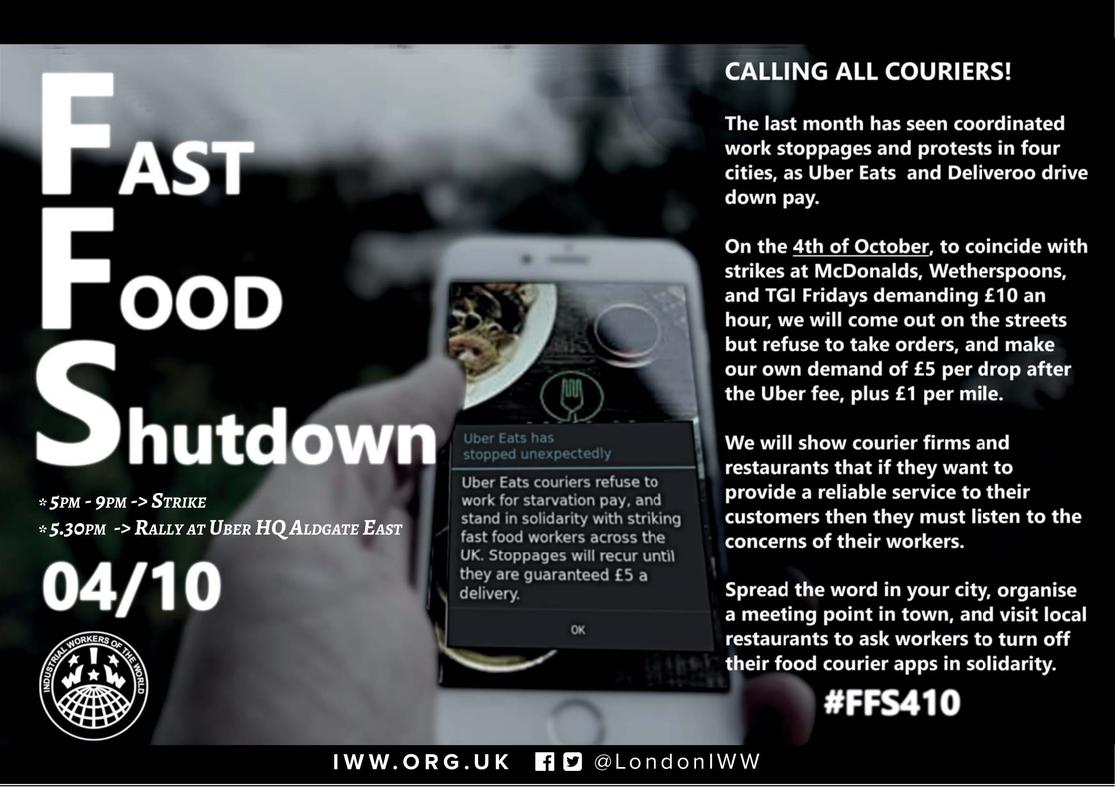
Featured in A Month of Revolt in the Service Sector (#4)
Subscribe to Notes from Below
Subscribe now to Notes from Below, and get our print issues sent to your front door three times a year. For every subscriber, we’re also able to print a load of free copies to hand out in workplaces, neighbourhoods, prisons and picket lines. Can you subscribe now and support us in spreading Marxist ideas in the workplace?
Read next
